
Healing recipes
In a small backpack, which she carries easily with one hand, there is an orange notebook with the Superhumans Center logo and the inscription “Antonina Demydenko, Recipes”.
Using a blue ballpoint pen, the 58-year-old woman has spent the last few months writing down in the notebook all that might once have been written in the 96-page, time-worn writing book she used to own. She kept the notebook in her kitchen cabinet in Vuhledar, a town in Donbas. Whenever she baked something, she took it out, and when she made some food preservatives, she took it out too. Until a Russian missile hit her home.
Antonina lost her arm, leg, and home. And her only son.

In her orange notebook, she brings back the tastes of her home: the pastries she used to treat her family to and share with her neighbors. If all goes well, these recipes will be included in a book. She wants to use it to bring back to life people who have experienced injuries and losses. She dreams of returning to Vuhledar. Her son is there. He was killed by the Russians and buried by the neighbors opposite the entrance of her apartment building. To get there. To walk. Crawl. Find the grave. Re-bury him. And then to “live because you have to”.
Antonina is a civilian woman, a wife, and a mother. In her kitchen, she cooked borscht, baked shortbread cookies, and honey cakes, and made cakes on a frying pan. She was going to the kitchen when the missile hit, killing her son and injuring her. Now she bakes in the ergotherapy kitchen of the Superhumans Center, and when the sweet smell of vanilla comes, men on prostheses open the door, look inside, and ask with a smile: “Are these for us?” The cookies give her the strength to smile too.
Soft-glazed cookies
“Do you remember soft-glazed cookies?”
She was six years old. She was one of only two girls on her street in Kuchynivka, the village in Chernihiv Oblast where she came from; the rest were boys. They raced along the roads, caught a fish in the pond, played on the tractor-trailer until the driver saw them, looked for fresh eggs in their granny’s henhouse, and ran to the shop to exchange them for some soft-glazed cookies. Large round cookies coated with white sugar glaze were common cheap sweets in Soviet-era shops. Two eggs cost 14 kopecks. Exactly enough for three soft-glazed cookies.
There were seven children at home, including Tonia (short for Antonina). If her mother wanted to treat them to something sweet, she would make mulberry dumplings, big enough to fit in the palm of your hand and incredibly juicy. She also baked soft butter rolls. The dough would rise above the bowl, and Tonia would come running, touch it with her finger, and pop it into her mouth. Sweet and delicious. Of course, the dough would immediately fall, and her mother would scold her… Tonia would run out of the house happy.
Tonia is 58 now. The gray-haired woman in blue shorts and a black T-shirt sits in the lobby of a rehabilitation center. All she has are memories of the tastes of her home. She has been living in Lviv for two years, in the same corner of a room on the hospital’s ninth floor. Before that, she lived her whole life in Vuhledar.
She still likes to pinch off a bit of sweet dough and quickly put it in her mouth, just like she did as a child. When she does this, her eyes laugh.
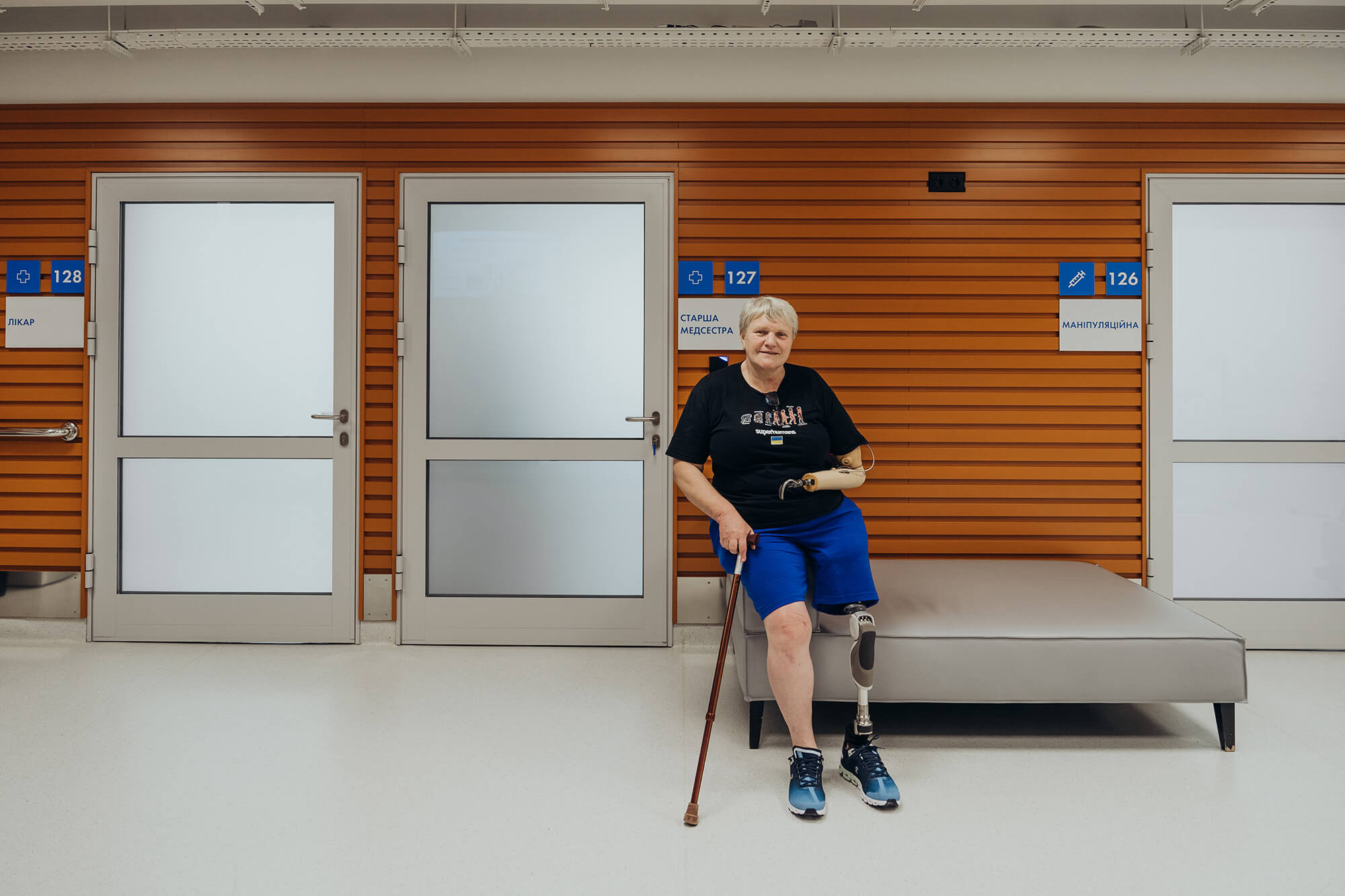

At the Superhumans rehabilitation center in Vynnyky near Lviv, which helps veterans and civilians with amputations and severe injuries get back on their feet, patient Antonina Demydenko is called a super granny. Here, she had her leg prosthesis replaced and was taught to walk well, and recently she was fitted with a prosthetic left arm, a cosmetic one because the elderly woman lacked the strength to move a mechanical one fully. But her new arm is already helping Antonina in her everyday life and in the kitchen: she attaches her backpack to the mechanical hooks, and she can use them to carry a bottle of juice or hold a bowl while kneading dough.
“Mariika, my occupational therapist, thought for a long time about how to get me interested in doing something. She kept asking me: ‘What did you do at home, in Vuhledar? What did you like to do?’ ‘I used to bake for my boys,’ I said, thinking about it. She kneaded and cut our first cookie dough for me herself,” Antonina recalls.
Everyone ate the cookies; no one guessed where that delicate flavor originated. The cookies were made with brine. The same homemade ones, the recipe for which was written in the worn notebooks of every woman from their nine-story building in Vuhledar on the 30th Anniversary of Victory Street, now shattered by Russian missiles. The softest cookies are made with tomato brine, Antonina says.
Since then, she has been baking from time to time.
Live and enjoy your life
Antonina and Mykola settled in the city in the south of Donbas in 1984. After a while, they got a two-room apartment. The three high-rise buildings stood next to each other, and in Vuhledar they were called the “Chinese wall”. In her youth, she worked a little at a factory and a little as a road service worker, until she became pregnant. Her son was born sick and did not walk for a long time. He was a person with intellectual disabilities, but she says he never spent a day in a residential care home.
Antonina listened to those who said that it would be worse for him over there. She devoted all her time to her son, whom she tenderly called Vitiok, and in her old age she was left without any employment history. She taught him how to fry eggs, heat food, and wash the simplest things. He spent most of his time in the courtyard, where everyone knew everyone.
“It was a nice town, a young town. Everyone went there to work. Then the park was organized, and fountains of flowers sprang from the ground—live and enjoy your life. And then this happened…” she sighs.
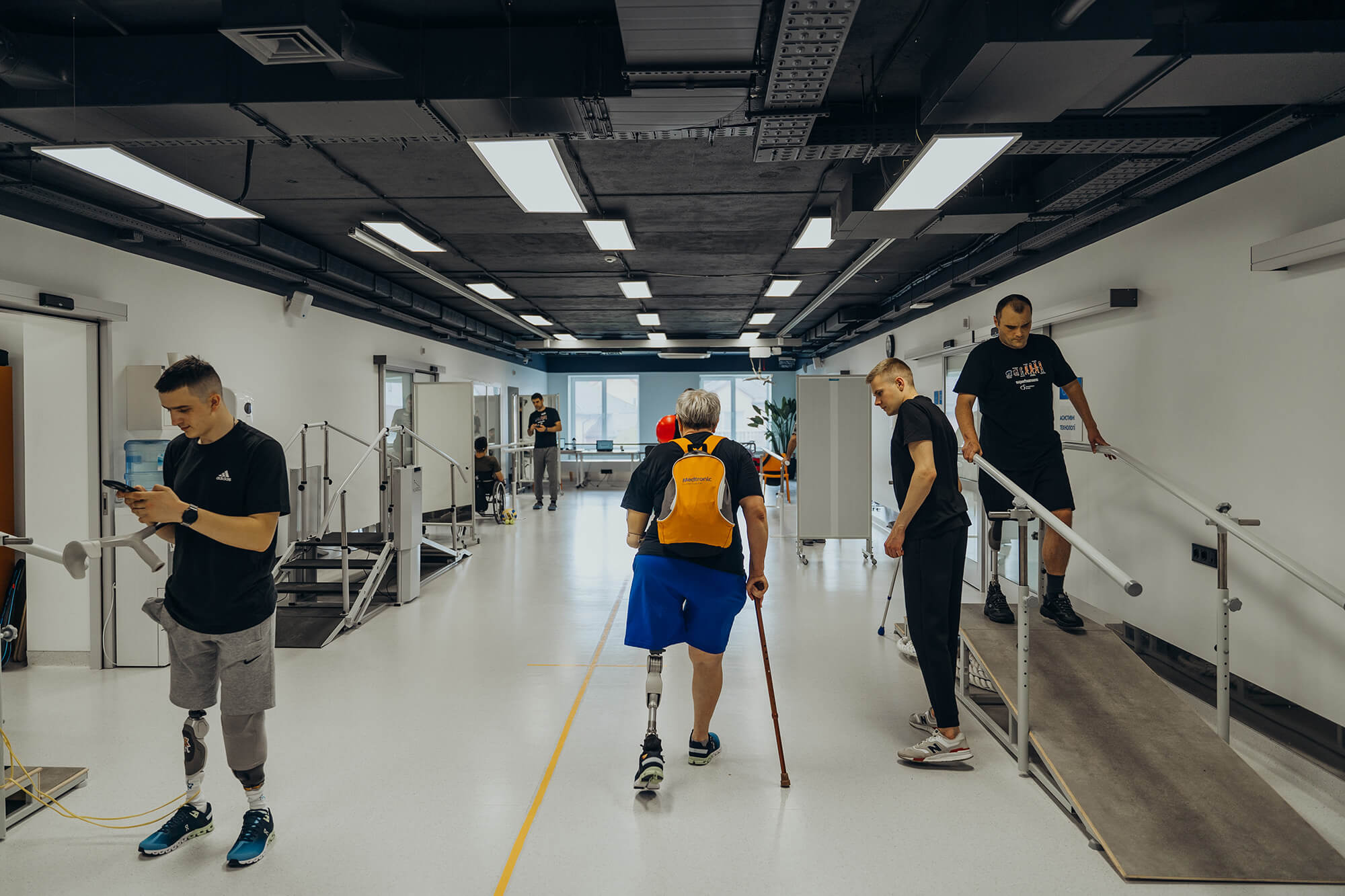
Vitiok took his father’s death (he died in 2014 from pneumonia) calmly. I explained to him that the father was there, but not near, and he saw everything. But I could not explain the war. My son did not understand why there were so many soldiers in his city, why there was no water, where the food from the shops had disappeared, and where their normal life had gone.
“We taught him to love,” she recalls tenderly. “We didn’t give up. He was compassionate, if you stroked him with a word, he would give you his soul, if you made him angry, he would become aggressive.”
Vitiok loved sandwiches the most. His mum did not give up and pleased him with cakes and pies.
“You cut the apples into a frying pan, add water, and sugar, then stew them, and wrap it all in a pie. Mmmmm… My family loved my baking, and I was filled with love for them. They would say to me: ‘Mum, you need to lose weight.’ And I’d say, ‘No, you need to get fat’.”
They visited each other’s houses. They were going to celebrate the anniversaries of getting their apartments in their courtyard. Antonina did not want to celebrate her last birthday in Vuhledar: Donbas was thundering and it was disturbing. She was born on Feb. 26.
On May 13, 2022, Russian troops shelled not only Vuhledar but also other surrounding towns and villages. Civilians were attacked with aircraft, tanks, heavy artillery, and Uragan multiple rocket launchers. In the morning, the Demydenko family cooked sorrel borscht and ate it. Then they brought some borsch to their friend who lived in another entry section of the building. They came back, heated the water and bathed. Vitiok went to shave and Antonina was washing clothes in the corridor. They saved a lot of water by doing the laundry in the same water they used to bathe.
“I had to get something from the kitchen. I started to go. Already at the door, I heard a terrible crack. I came to my senses and saw that my left hand was lying a little further away. But I didn’t notice that it was hanging only on my skin. I tried to lift the other one, but I couldn’t. Then something fell on my head, probably a clock hanging on the wall. I opened my eyes when they pulled me out. There were a lot of people around. And a policeman shouted: they had to cut off my arm, the one that was barely holding on. They started to cut it and I screamed and passed out.”

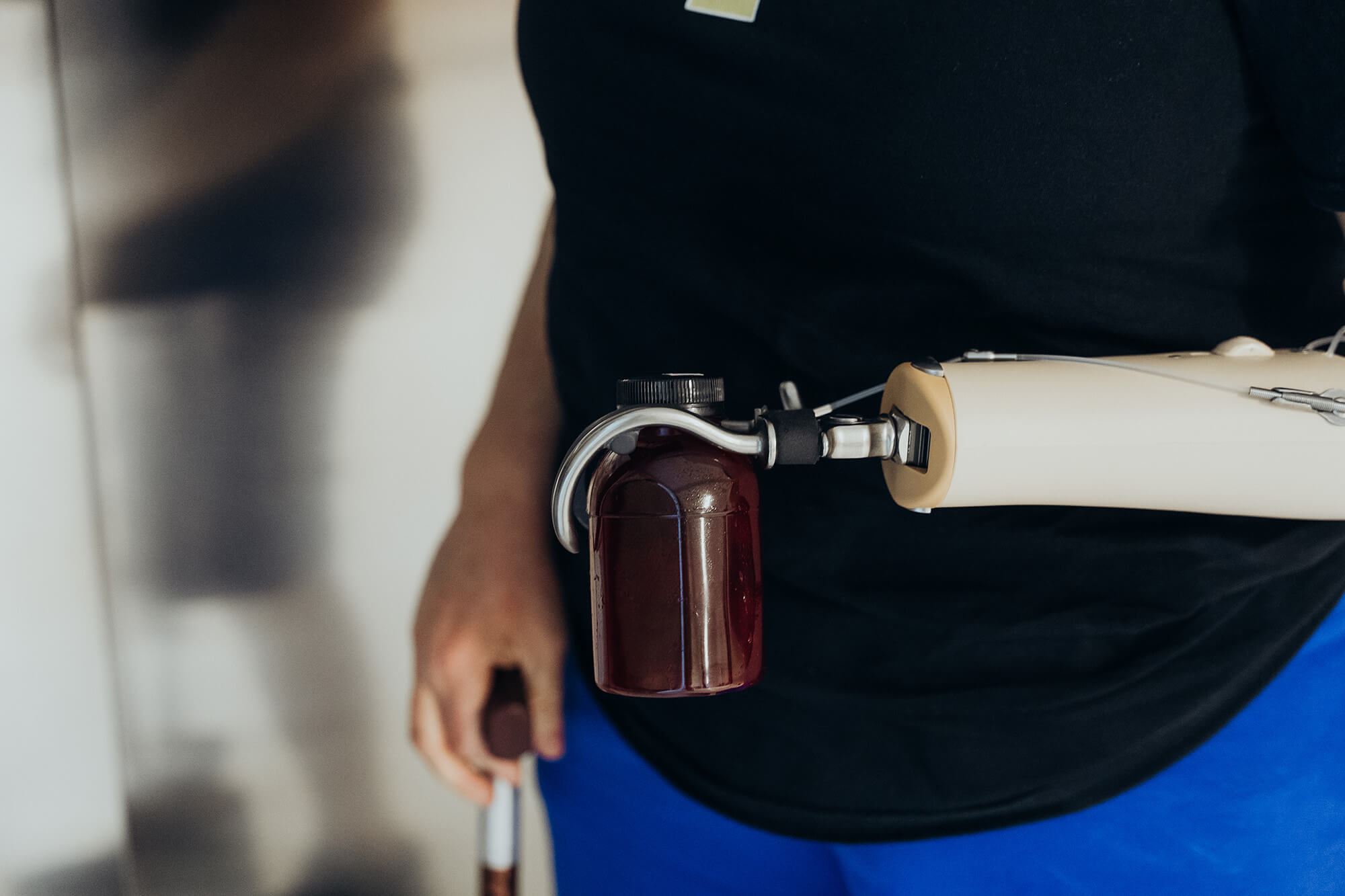
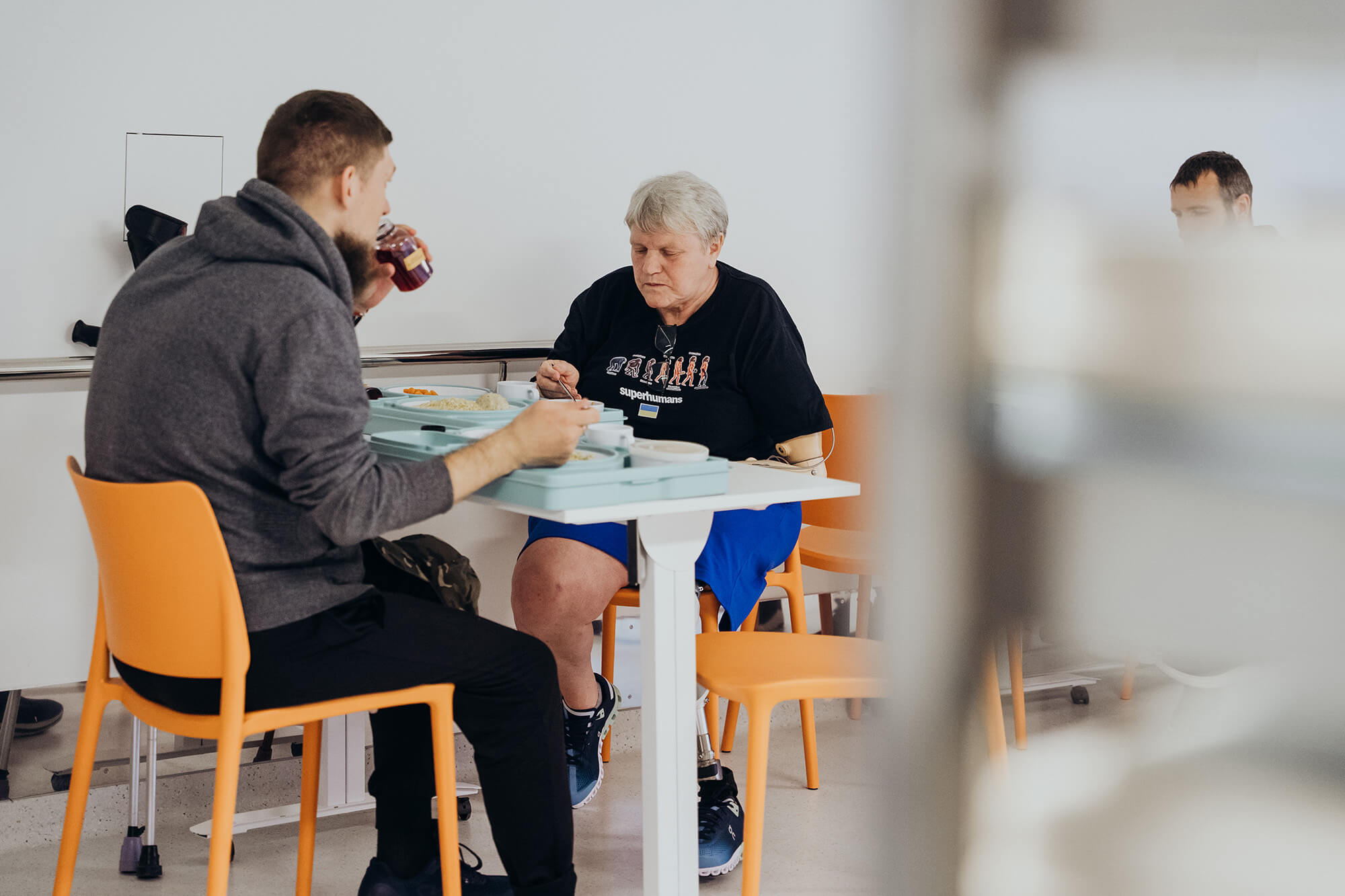
The Ukrainian military took her to the nearest hospital in Kurakhove. There she regained consciousness. They asked her is she had any medical conditions, and she mentioned diabetes.
“I look at the young doctors and say: ‘My dear, just save my dentures’. I don’t know why I said that. Suddenly I thought: if I can save something, then let’s have at least this. And they said to me: ‘How are we going to save them?’ I said: ‘Put them in a glove and tie them to my finger’. And they did! Can you imagine? In the hospital in Dnipro, other doctors noticed them on the windowsill: they were just lying there in a bag… I’m very grateful to them. This is my inheritance,” this is how the unknown doctors left Antonina with a smile from Vuhledar.
Even after two years, she cannot watch any photos or videos from her hometown. If she hears from anyone, she just asks: “Is it still under us?”. They say: “Under us”, meaning Ukrainian. Then she becomes calmer. Doctors waited a month to tell her that her only consolation in life, her thirty-five-year-old son, Vitiok, had died on the day of the shelling, under the rubble of their apartment building. Now, everything she does and finds the strength to do is for the sake of lying down by his grave one day.
“He is still buried there, opposite the entrance of our apartment building, on the lawn. The neighbors told me about it, and I saw it in the footage. Later, apparently, someone put up a plaque that he died in April, but in fact, he died in May. I have only one incentive—to rebury him. Either there, or take him here. I need to get back on my feet.”
In the hospital near Lviv, Antonina continued her treatment. One day, she saw that the Superhumans Center was recruiting people for prosthetics and asked them to teach her how to walk well, because she could walk down the stairs but not up. And she was without an arm.
Currently, her daily route is from the Superhumans Center, which is next to her hospital, to her room on the ninth floor. She walks through the courtyard, often leaving through the side door to avoid the stairs. Then there is a threshold with a wheelchair ramp and several corridors, the walls of which are decorated with paintings of the Virgin Mary and Jesus, and posters designed to support the wounded. Up the lift—there is a room with several beds, one of which has a wheelchair next to it.
From the balcony, she can see the blue sky, a yellow rapeseed field interspersed with green stripes of sown gardens, and the unfinished building of the same hospital.
For two years now, since June 2022, Antonina’s entire life has been contained within her bed, the bedside table next to it, and the wide windowsill. In the wardrobe opposite are the two prosthetic legs she used to wear before her current prosthesis, and her new hand, which she says she can wear instead of hooks, ‘just for the beauty’. Several small icons are attached to the square-shaped electric point on the wall above the bed. If Antonina turns to her right side, her eyes rest on the icons, and if she turns to her left, they rest on a cup on the windowsill. On the cup are two photos of people who stayed in Vuhledar forever. The desire to return to them keeps her alive and gives her strength. Her husband and son.
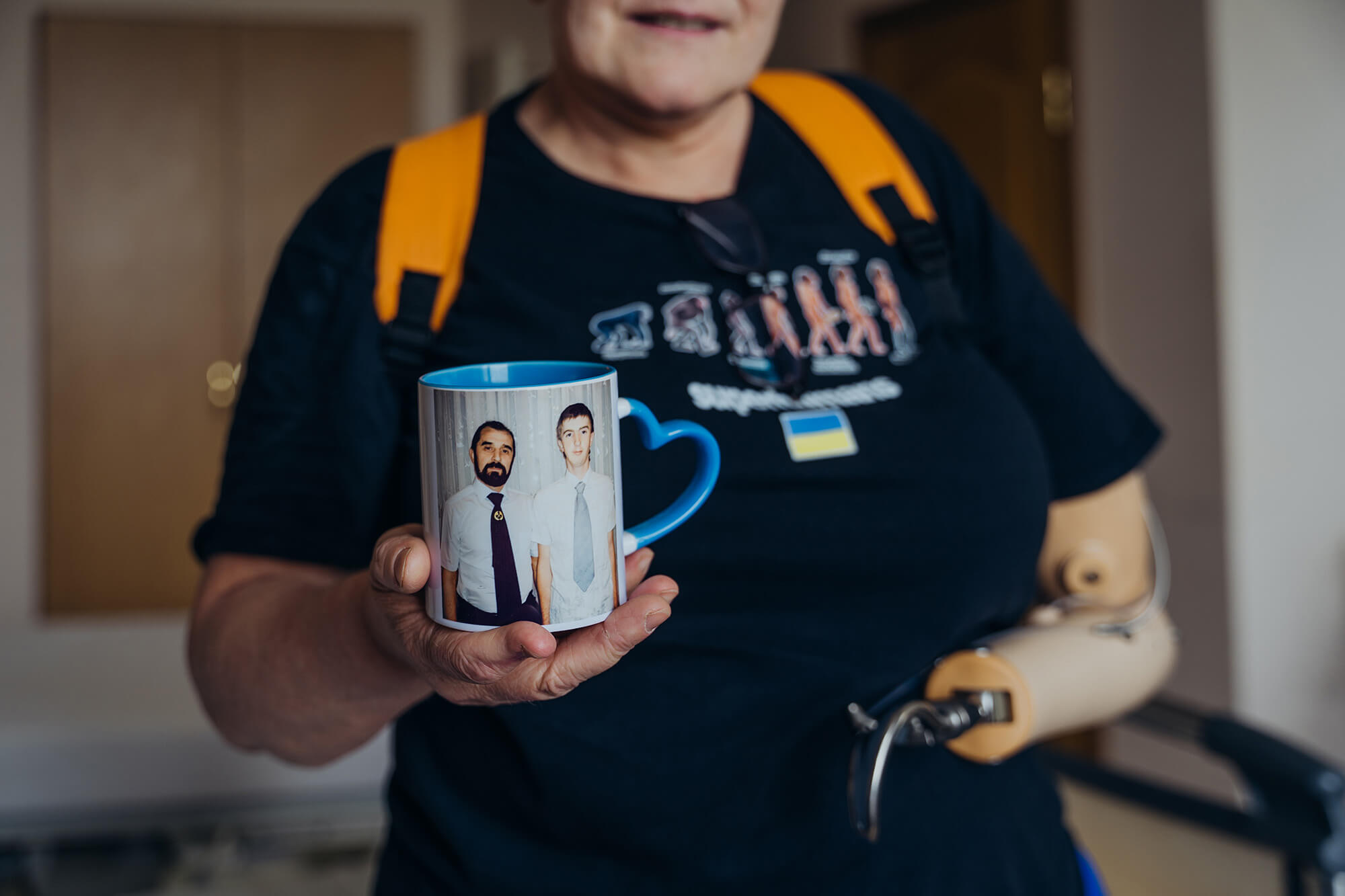

“Only the grave of one has yet to be found. I hope they didn’t hit it,” the woman whispers.
The cup with the photos was presented to Antonina by her friends in Lviv. Antonina searched for photos of her family wherever she could: among friends, acquaintances, and relatives. When she found them, she wanted them to always be with her. She does not drink tea from this cup.
12 spoons of sugar
In the Superhumans kitchen, Antonina is bustling around like she used to at home. Beside her, her occupational therapist Marta hands her ingredients. Antonina holds a green bowl with the future dough with the hooks of her left arm prosthesis. Today, they are baking shortbread cookies and stamping the rehabilitation center’s logos on them: they will sell them at the Kurazh Charity Festival in Podil, Kyiv, to raise money for prostheses for Ukrainians affected by the war.
“Do you have any soda? Or vinegar? Then look for kefir!” she commands.
She measures ingredients the way she always has. 240 grams of sugar? It’s simple: that is 12 tablespoons! Marta raises her eyebrows in surprise, and Antonina, a woman her mother’s age, or even her grandmother’s, adds something that makes Marta smile broadly:
“I’m from the USSR!” she says, remembering the time when recipes were written not in grams, but in the number of tablespoons, teaspoons, or glasses.
The center’s kitchen has modern equipment, everything is ergonomic, and even the utensils and dishes are designed to allow people with amputations to learn to use them.
“They gave me a kitchen board,” she shows it on the table, “and last year I was lying there thinking: how am I going to do anything in the kitchen? And I came up with an idea: I would ask them to put nails in it, and I would fix products on it and cut them with one hand. Now I look at it: the board is just like I dreamed of!”
From brine cookies, Antonina moved on to sticky buns, cakes, and French pies. And now the dough under her hand is softening and thickening. She kneads it vigorously and briskly. In the meantime, she tells jokes and various stories. The woman’s speech is simple, interspersed with regional dialects, surzhyk [Ukrainian-Russian pidgin used in certain regions of Ukraine and the neighboring regions of Russia and Moldova—Ed.], and sharp words. But when she talks about her grief, her language becomes more literary—it is clear that Antonina has thought about it many times, talked it through, and found the right phrases.
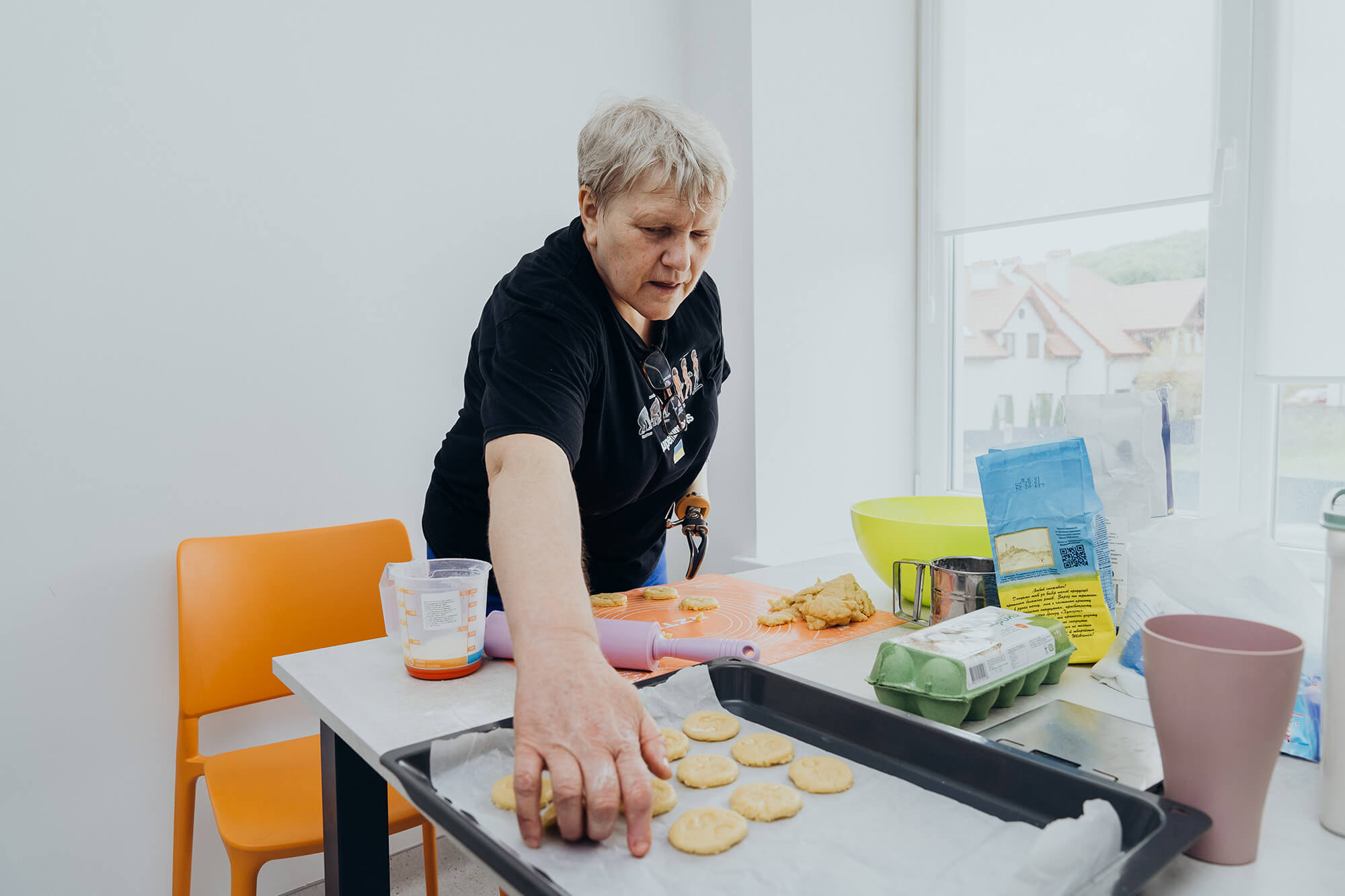
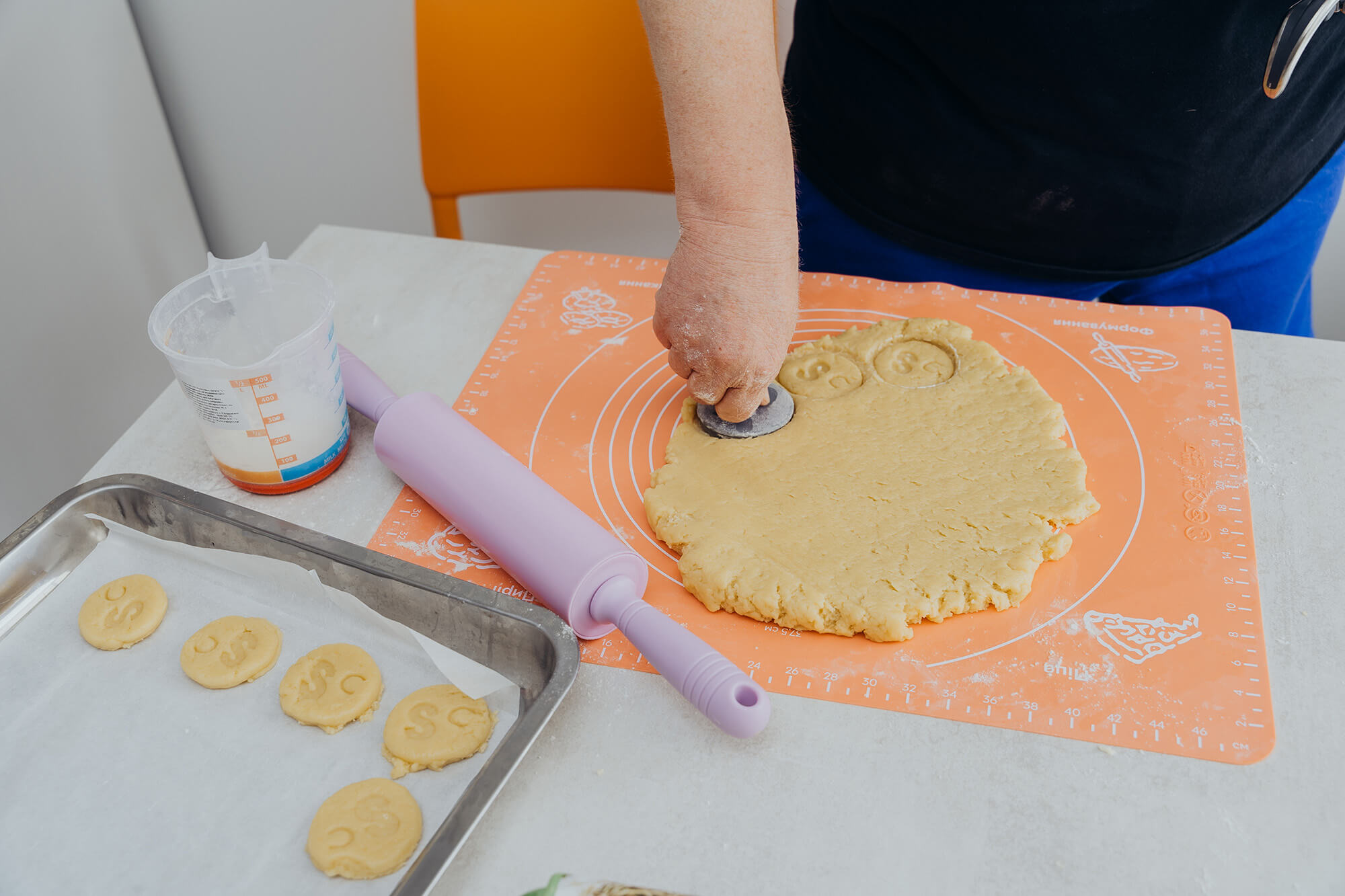
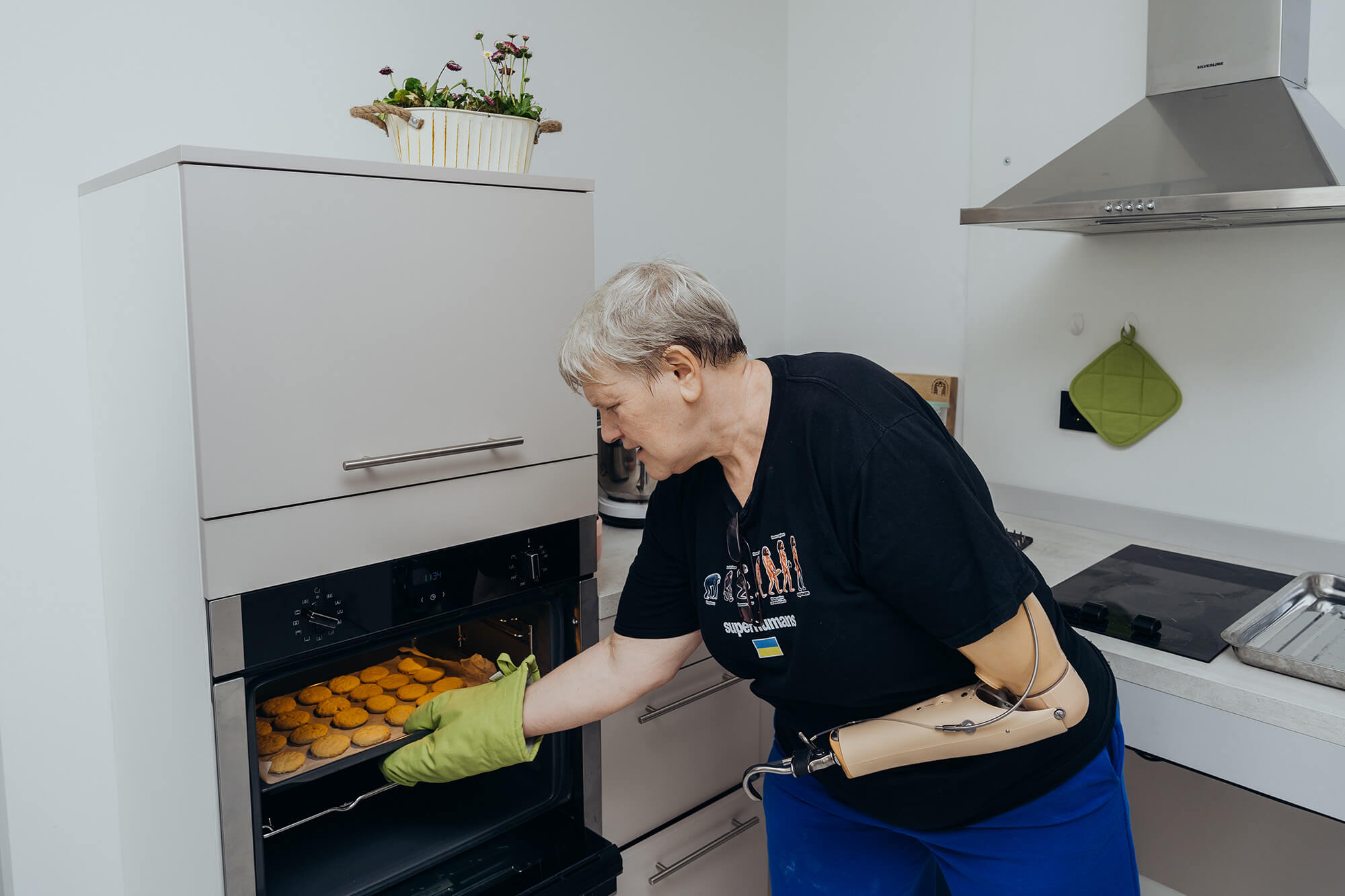
“They put me into a good trance!” she nods at Marta, referring to the entire staff of the center, “When I started baking, I could barely crawl around the kitchen, learning to walk. They helped me put the dough in, and then they ran off to class with the other patients. I waited for them, but they didn’t come, so I started to do it myself. It’s hard to put it in the oven with one hand. I brought it, put it in, and that was good. Then I needed to take it out; okay, I pulled it out. For Olia’s birthday [Olha Rudnieva, CEO of the Superhumans Center—Ed.], I baked a chocolate cake in a frying pan and spread it with sour cream and condensed milk cream, just like I did at home. Of those first 26 sticky buns, just half a bun was left! Sometimes, I don’t have time to grab it for myself.”
The 58-year-old woman from Vuhledar inspires young veterans with amputations with her cheerfulness. If she can do it, they can do it too!
“Look at them: young, 25-year-old ones, they have no legs, but get up and walk. It’s even harder for them because they have so much life ahead of them, and I have to be an example for them. Very often, I have to encourage people much younger than me, smile, and say: everything will be great. What else can I do?”
Sometimes, she also felt that she could not get up—she would just lie there for a long time. If during the day she could still live a normal life during the day, she would cry into her pillow at night. But she learned to say to herself: “Get up, you have to!”
“What else can I do? No one will do it for me. I pull myself together and go. Yesterday, they gave me flat shoes…” Antonina makes cookies and shows her foot in her new sneaker from under the table. They are light and comfortable. She calls them flat shoes. However, she spent her entire life in dress shoes and sandals. She loves open shoes.
The sweet aroma of cookies fills the kitchen.
The Superhumans Center came up with the idea of creating and publishing a book with recipes from her Vuhledar life. Her occupational therapists concluded that the most valuable thing for this civilian woman is to be useful to someone. The book proceeds will be used to help her find a place to live and finally exchange her hospital room for something more comfortable. This also gave Antonina another goal. She comes back from classes, rests, and then sits down to write in the evening. She writes the recipes in a notebook with a cat on the cover, then transcribes them into her orange notebook. She collects the recipes one by one.
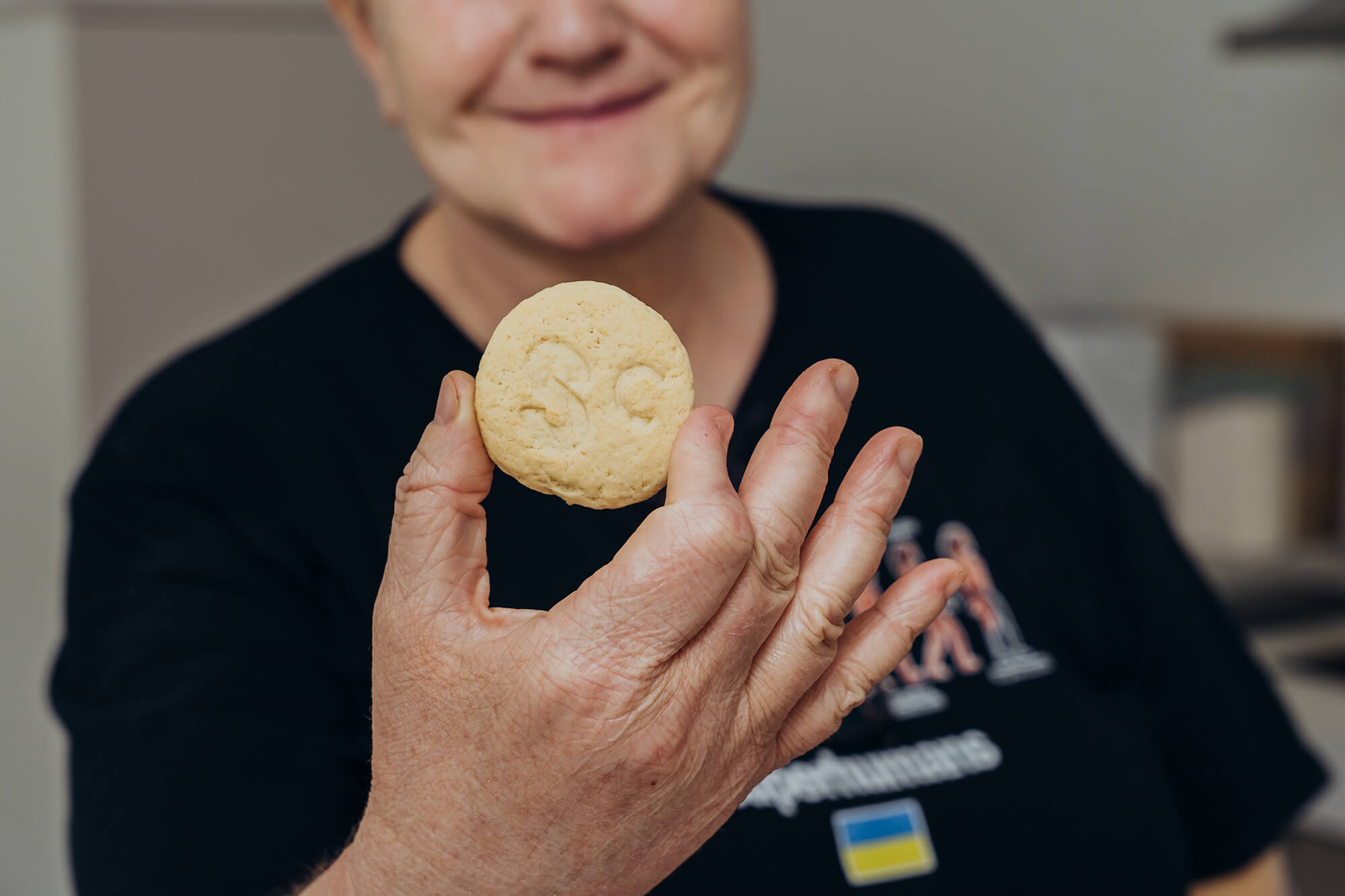
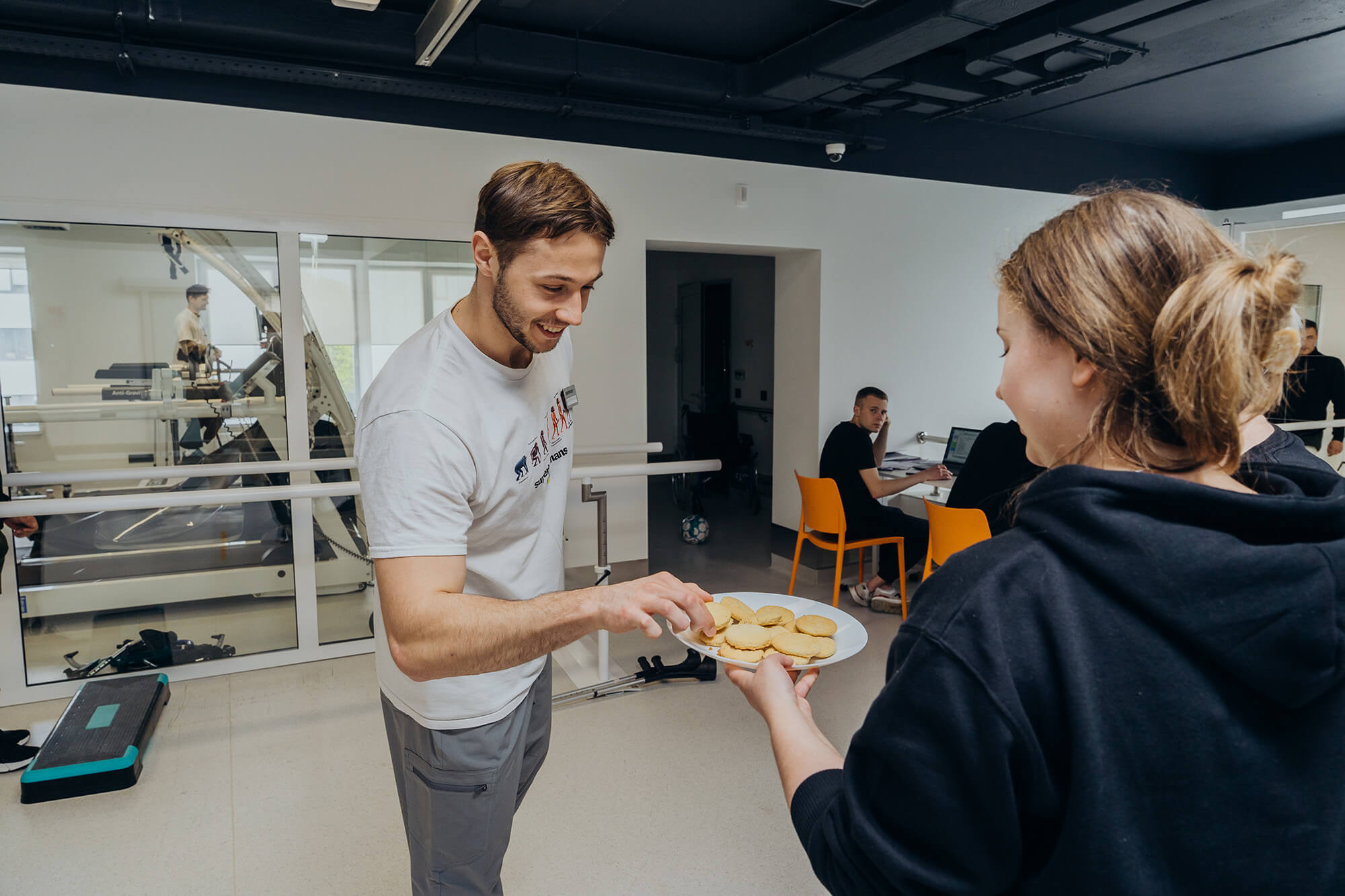
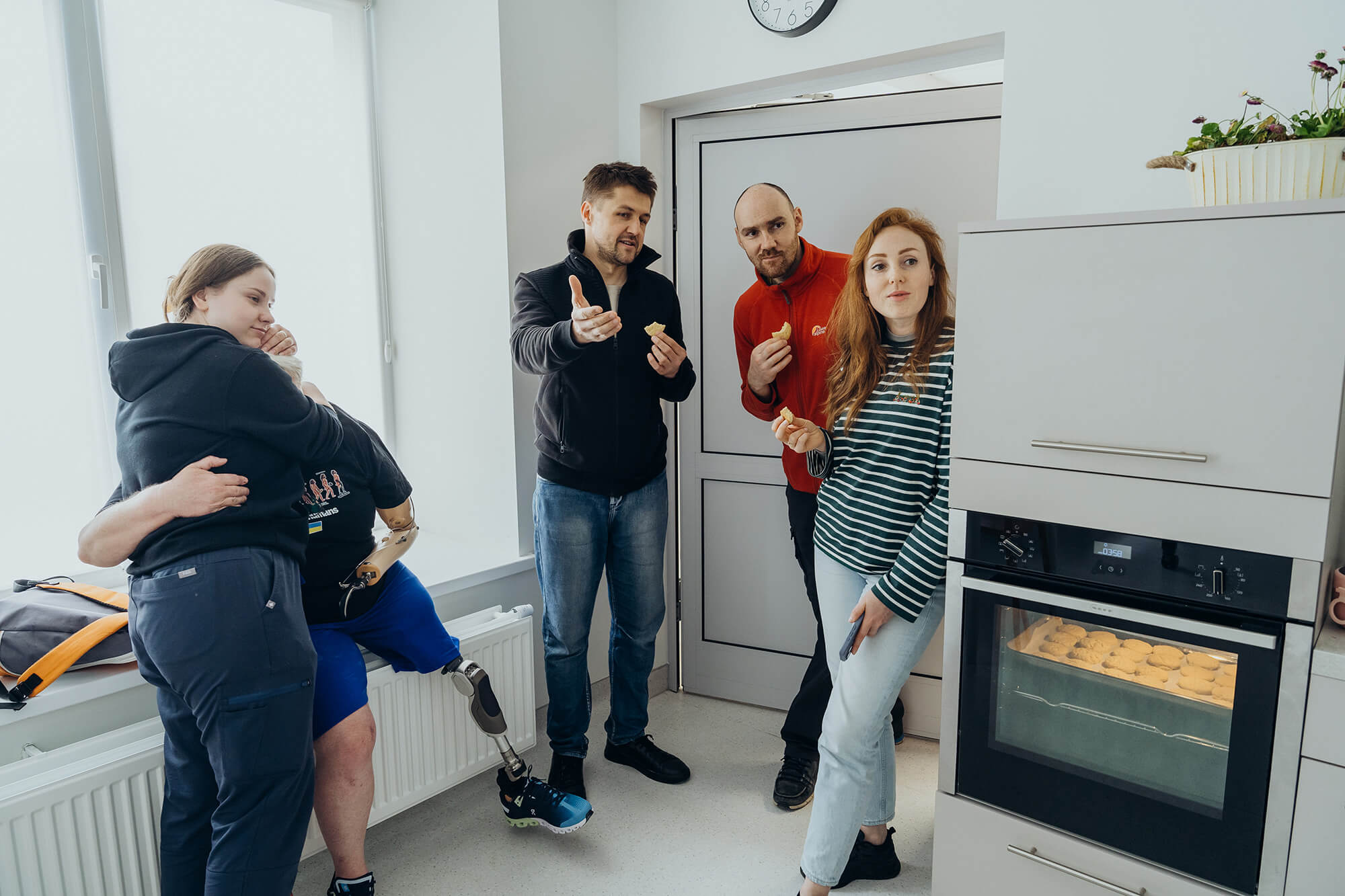
There are manna cakes, shortbread cookies, brownies, and deep-fried pastries… “Peasant Cookies for a Penny”, “Biscuits for Coffee with Lard”, or “Big Cake in a Frying Pan”… Women know how to name their baked goods in a way that reflects their lives. There are “Tania’s Crackers,” a recipe she once wrote down from her neighbor Tania. There is the “Sober Cherry” cake, a bold Vuhledar interpretation of the popular “Drunken Cherry.” And there is a lot of Vuhledar in these recipes.
Olha Martynovska, a restaurateur and judge of a popular culinary project, one of the ambassadors of Superhumans, will help her organize the tastes of her lost life. But for now, Antonina cooks, writes, and reminisces a lot. Is her life worth a book?
“Why not? For the sake of the memory of my son and for the sake of people who need to know that it’s hard, but you can live. You can and you have to live. You know, when you have had help in your life, you want to help others. And if these recipes give someone the strength to get out of bed or even cook something, I will do it. Let them know that one can do it with one hand,” she thinks. “…One morning, we woke up in the apartment to a smell from the kitchen. Vitiok was four at the time. I smelled burnt dough. In a moment, he brought us a big hard cookie to bed. He kneaded it with water and flour, baked it in a frying pan, and wanted it to be just like his mother’s. We laughed so much that we would never be hungry. I would have given everything for that cookie.”
“The Power to Continue” is a collaborative project between the United Nations Development Programme in Ukraine and Reporters. Our goal is to share unique stories of veterans and civilians who have lost limbs in Russia’s war against Ukraine, and not only found the strength to survive the trauma but also became drivers behind social projects and bold business ideas. We also highlight the stories of people who have helped them along the way. While there are not many of them, these people inspire and speak openly about their experiences, and this might become a starting point for others.
The special project was initiated by Reporters with the assistance of UNDP in Ukraine and financial support from the European Union as part of the “EU4Recovery—Empowering Communities in Ukraine” project. The opinions, recommendations, assessments, and conclusions expressed in these materials do not necessarily reflect the official position of UNDP, the EU, or their partners.
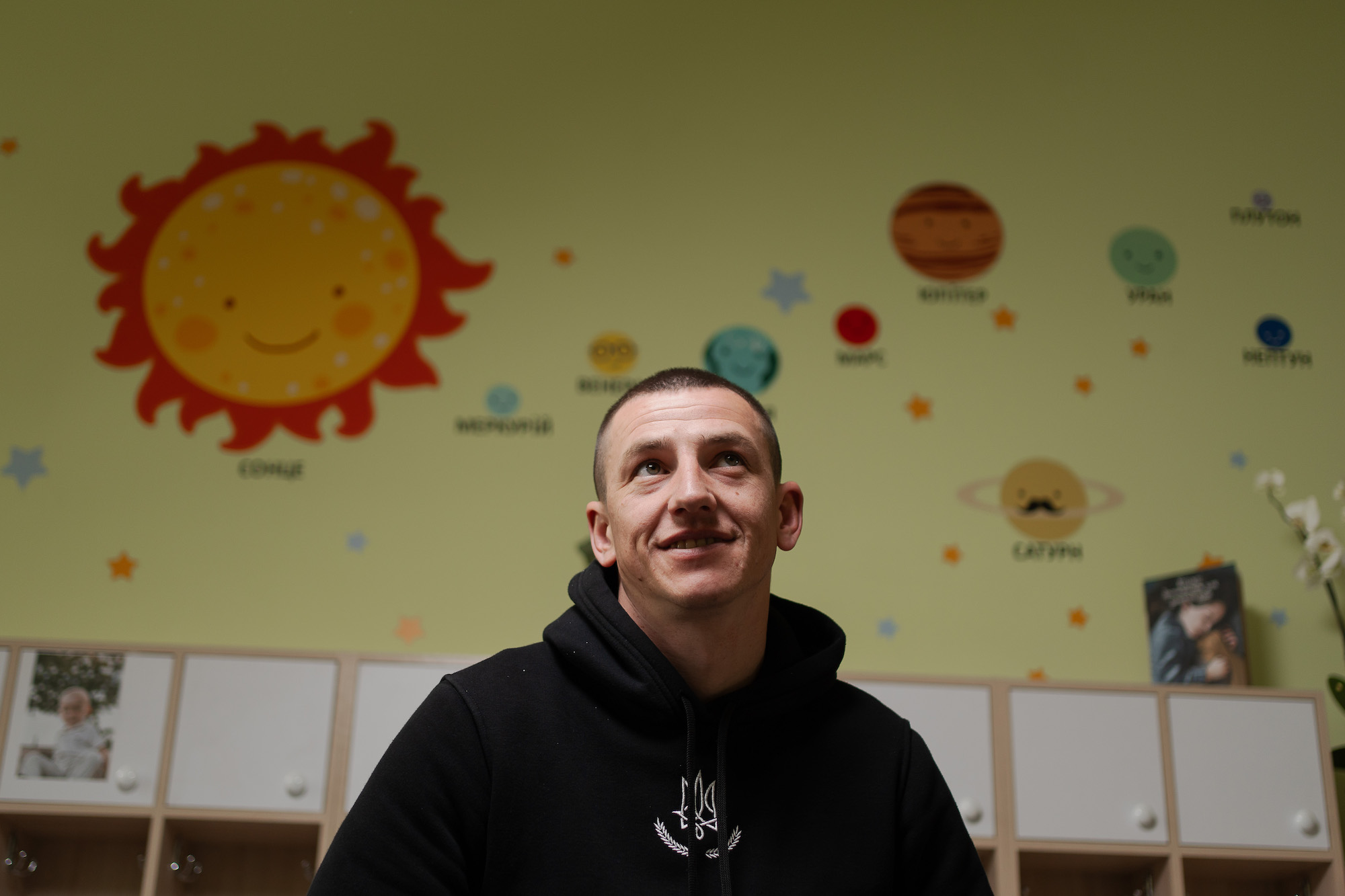
A story of a veteran artilleryman who opened a daycare center in Kyiv, where Barbie dolls in wheelchairs will soon arrive
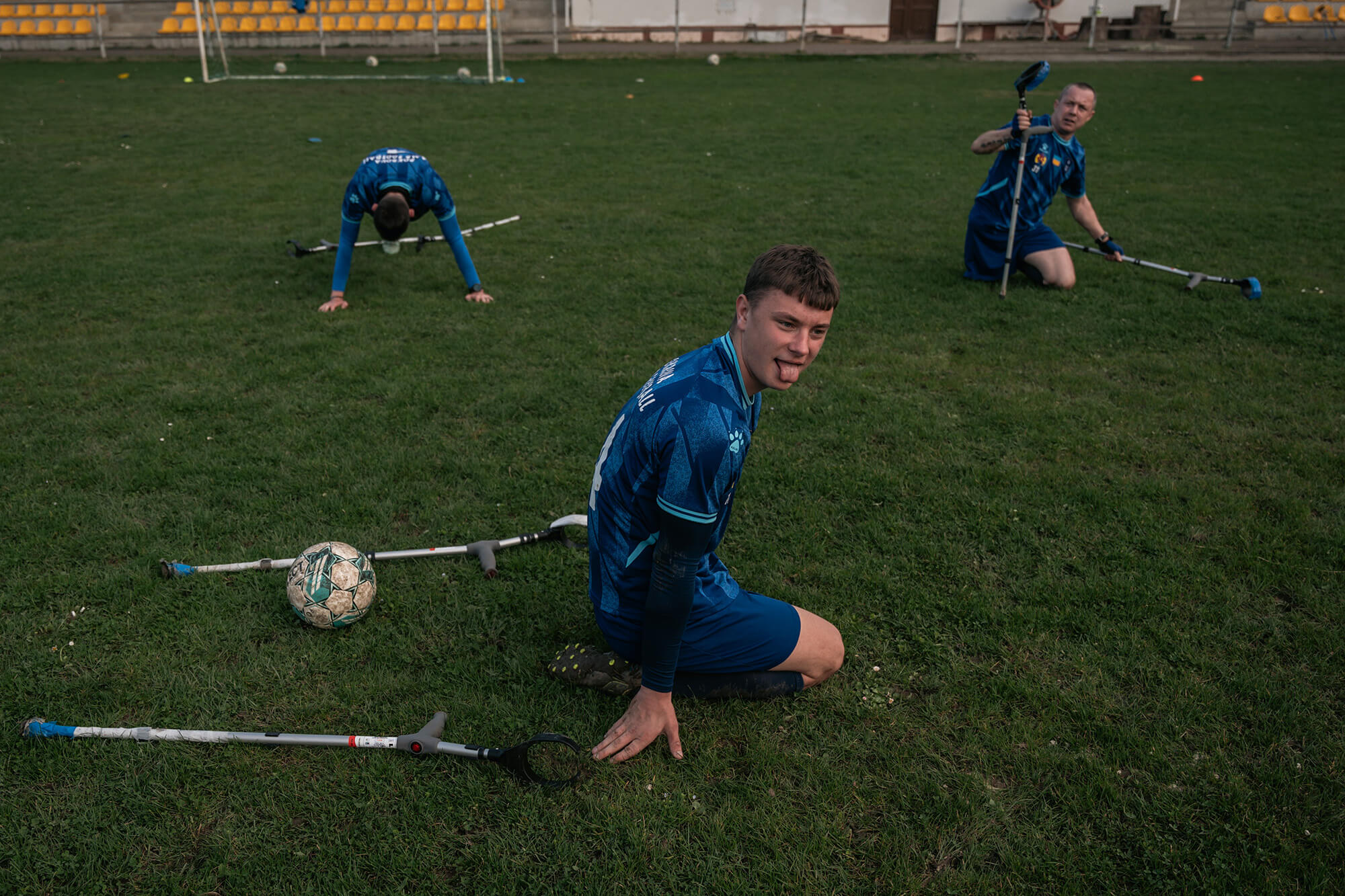
No opponent in the world daunts them. They remove their prosthetics and charge forward to seize victory
Have read to the end! What's next?
Next is a small request.
Building media in Ukraine is not an easy task. It requires special experience, knowledge and special resources. Literary reportage is also one of the most expensive genres of journalism. That's why we need your support.
We have no investors or "friendly politicians" - we’ve always been independent. The only dependence we would like to have is dependence on educated and caring readers. We invite you to support us on Patreon, so we could create more valuable things with your help.
Reports130
More






